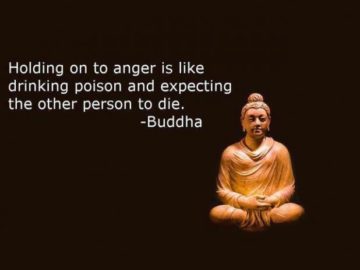by Chris Horner

Imagine you are put in regular close contact with someone who regularly makes your life difficult. This could be at work, or a flat share, anything. They leave you to finish the chores they start, invade your space, and generally act in an inconsiderate way. You’d like to put some space between them and you, but you can’t. Perhaps you’ve some choice words for them which you are preparing to share, but holding back your exasperation you try to point out to the person the problems they are causing. When you start to do that, this person responds by disclosing that they have a condition that, according to them, makes them act in this way. For our purposes this could be anything: ADHD, autism, PTSD, neurosis stemming from childhood neglect, bipolar – anything (to be clear: I am not suggesting that any of these are necessarily connected to antisocial behaviour; let’s also assume that they aren’t inventing the diagnosis, and that the condition is real). [1]
How does this change your feelings about the situation, if at all? Perhaps you try to talk through the situation to find a way to work with this person to mitigate the antisocial behaviour. But it continues. You might find a way of leaving the situation, or of getting outside assistance. You might check that there has been a legitimate medical diagnosis, all sorts of things. Suppose the condition has been diagnosed by a qualified person. So they do have this condition. Again: what has changed?
Many people would want to show some compassion, in that case, rather than anger, because the person is not fully responsible for what they do. We separate the agency of the person from the condition. If we think that the person could do something to limit their problematic behaviour, but is choosing not to do this, we will have a different response to the case in which the actions seem to be entirely beyond their control.
It’s interesting to note how the descriptive language of human behaviour, she did this or that, shades into normative language: she ought not to do that, he ought to do this. The second kind depends on the sense that the person could have done otherwise: and so we blame or praise, as ‘ought’ implies ‘can’. Our responses flow from the sense we have of agency and intention. If someone steps on my foot in the subway, I will have a different reaction if I think they were pushed or stumbled than if I think they wanted to hurt me. Our sense of what is morally right or wrong is grounded in that kind of outlook.
Actually, things are a bit more complex than that, as there are a lot of words that seem to be descriptive and normative at the same time, for example: ‘she is being mean with her money’ is hardly a neutral description of someone not buying drinks for her friends. Still, the person with the diagnosis is likely get a different reception to the person without it. In the latter case we may just decide they are acting like an asshole and respond accordingly. If the pain in the butt that is your coworker or flat-share explains that they had a tough childhood you might say: yes, but an explanation isn’t the same as a cause: other people with difficult childhoods don’t act like inconsiderate so-and-so’s. But how far can we take this kind of reasoning?
Determined to be annoying?
Consider this approach: wouldn’t a full explanation of anyone’s background, if it could be established, explain the causes of that person’s behaviour? After all, we don’t choose our character from the ground up: we are formed by environment and biology. What kind of person we turn out to be is no more a choice than what height we grow to, or the size of our feet. This account seems troubling as it seems to give up on the idea that we are free to choose this or that behaviour. It seems appropriate for the person suffering from ‘condition X’, but not for the co-worker or flatmate we view as greedy or selfish. But aren’t both the result of things that the person had no control over? And what does ‘control’ mean, here?
Supposing we found that someone’s aggressive or selfish behaviour was being caused by a brain tumour. When the tumour is surgically removed the behaviour changes; when the tumour grows back, the bad behaviour reappears. Here we have a case we can distinguish from the free will – the agency – of the individual. It’s not their fault, we say. But why is this different to the person who acts that same way because of their upbringing? How traumatic would it have to be for us to see it like the tumour?

Free to choose?
Behind our language of praise or blame lies the common sense notion of free will: people are responsible for what they do, because they could have done otherwise. It’s hard, though, to be clear about what ‘free will’ could be. If we espouse a view of the world in line with physics and science generally, we will think every event has a cause. But here we seem to have have a unique exception to the laws of nature: the free will of the human subject. Apparently now we have another X: a mysterious thing in us, unique in the universe, that is not determined by causes. How do we know about this uncaused Thing? We may say, we feel free. But a big metaphysical claim based on how we feel is surely not on secure grounds. And it seems at total variance with everything else we know about the world. And what would it mean to say that one acted without a cause? An entirely arbitrary act would not be a free one: it would be just random. We have reasons for what we do. But what makes one reason more compelling, if that is the right word, than another? Surely the answer lies back in the chain of causes that made us who we are?
Yet the view that our actions are determined by causes seems hard to accept. We don’t want to abandon the idea that people are responsible for what they do. Typically, we try to have it both ways. It’s as if we have to use two vocabularies in different contexts: descriptive, causal, and maybe medicalised in one kind of case (tumour, schizophrenia etc), and normative, ‘agency’ based in the other (the guy being an asshole). And that may be the best we can manage, if we care about the pragmatics of getting though life more than getting one True Account that covers everything. Still, anyone wanting a correct answer, not just a useful one, is likely to remain unsatisfied by the pragmatic approach.

The Double Focus
It may be sensible to adopt the following view: freedom is being able to do as one chooses, but the things one chooses to do – the reasons we have – are themselves causes, brought about by previous states of affairs. I can will A rather than B, and I’m free if the policeman or the coworker doesn’t stop me, but the reason why A gets chosen is buried in the conditions in which I came to be the kind of person who prefers A or B, and X to Y. Reasons are causes: a notion of freedom that is compatible with the idea that all events are caused. Hence this approach is called ‘compatibilism’ by philosophers. Freedom is redefined to make it just the absence of external constraints. This answer will not satisfy everyone, though.
We have a kind of double focus when it comes to human behaviour. When we look at the actions of others we can adopt causal and descriptive language or agent-centred, normative talk. It will depend on the context, and we may switch between the two. Certainly, in the case of the asshole we might take the view that his or her behaviour might be at the end of a chain of causes he had no control over, but that we should introduce another cause into the situation, namely our unwillingness to put up with it. The effective and humane approach might be to oppose the behaviour while refraining from condemning the person. Certainly it seems that some people’s greatest misfortune is their personality. This can be quite a difficult outlook to sustain, though. It is tough enough with annoying neighbours, but what about serial killers and genocidal tyrants?
When we look back at our lives we see that what happened was enmeshed in a web of causes. It looks as if things had to turn out that way. Yet when we look forward, our futures seem open to us, and we say we are free. Then our ‘free’ act, once it has been performed, retroactively appears to us as necessary, fated, even. Perhaps the universe, whether understood in terms of Newtonian or Quantum physics, has to appear to us in this way, with a cloud of unresolved possibilities ‘before’ us collapsing into a necessary state of affairs ‘behind’ us. At all events we have to live with it and in it, and alongside others, however much they may please or irritate. And let’s not forget that others have to bear with us, too. Whatever the balance between freedom and constraint, compassion for ourselves and others is generally in order.

[1] ‘Real’ conditions: this opens up a whole new area of discussion. Is something ‘real’ when/because it gets entered in the Diagnostic and Statistical Manual of Mental Disorders (DSM)? Or is reification going on? Do some ‘disorders’ deserve to be seen as mental problems or not: what about ‘sex addiction’, for instance? I can’t explore these issues here – they are for another time
